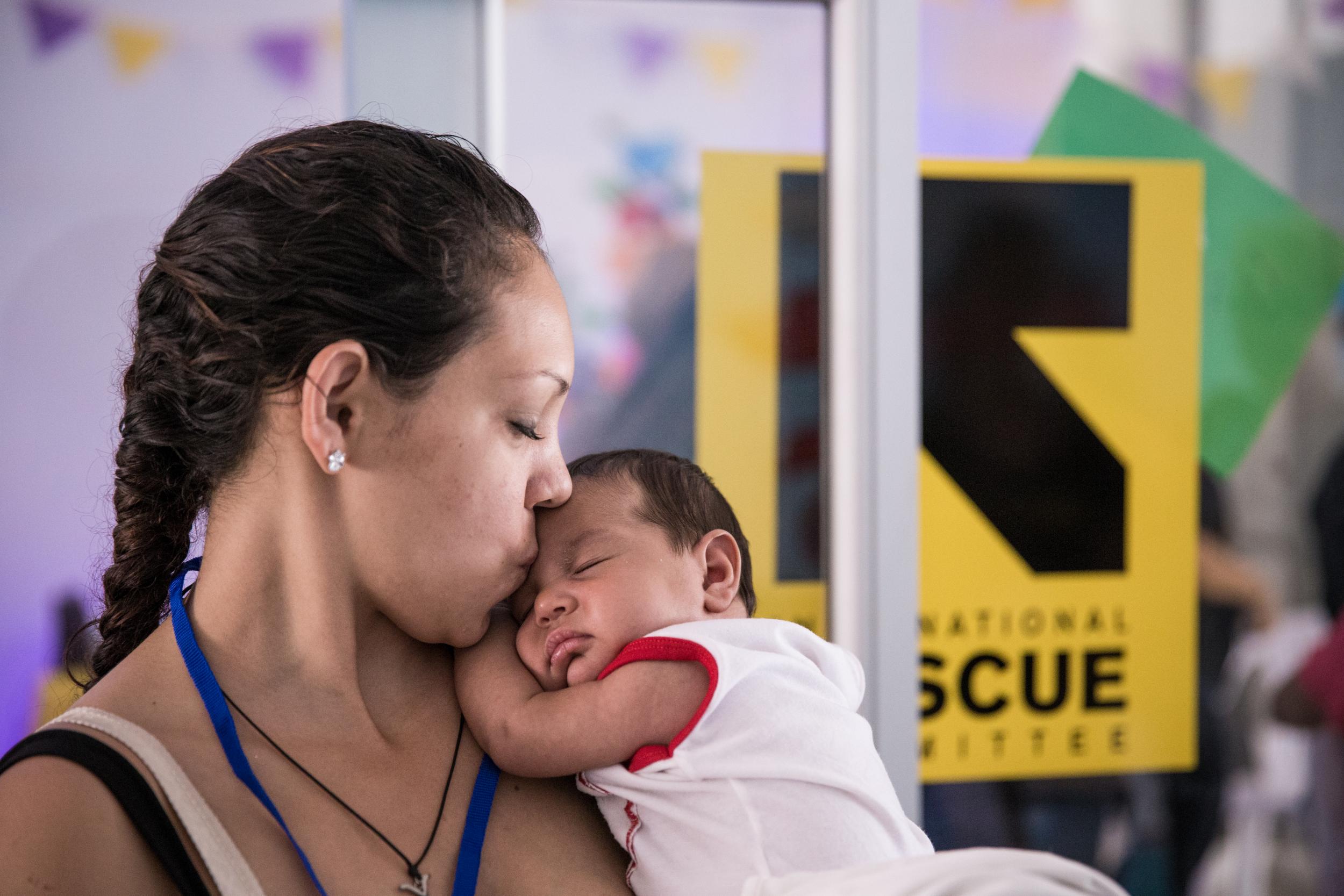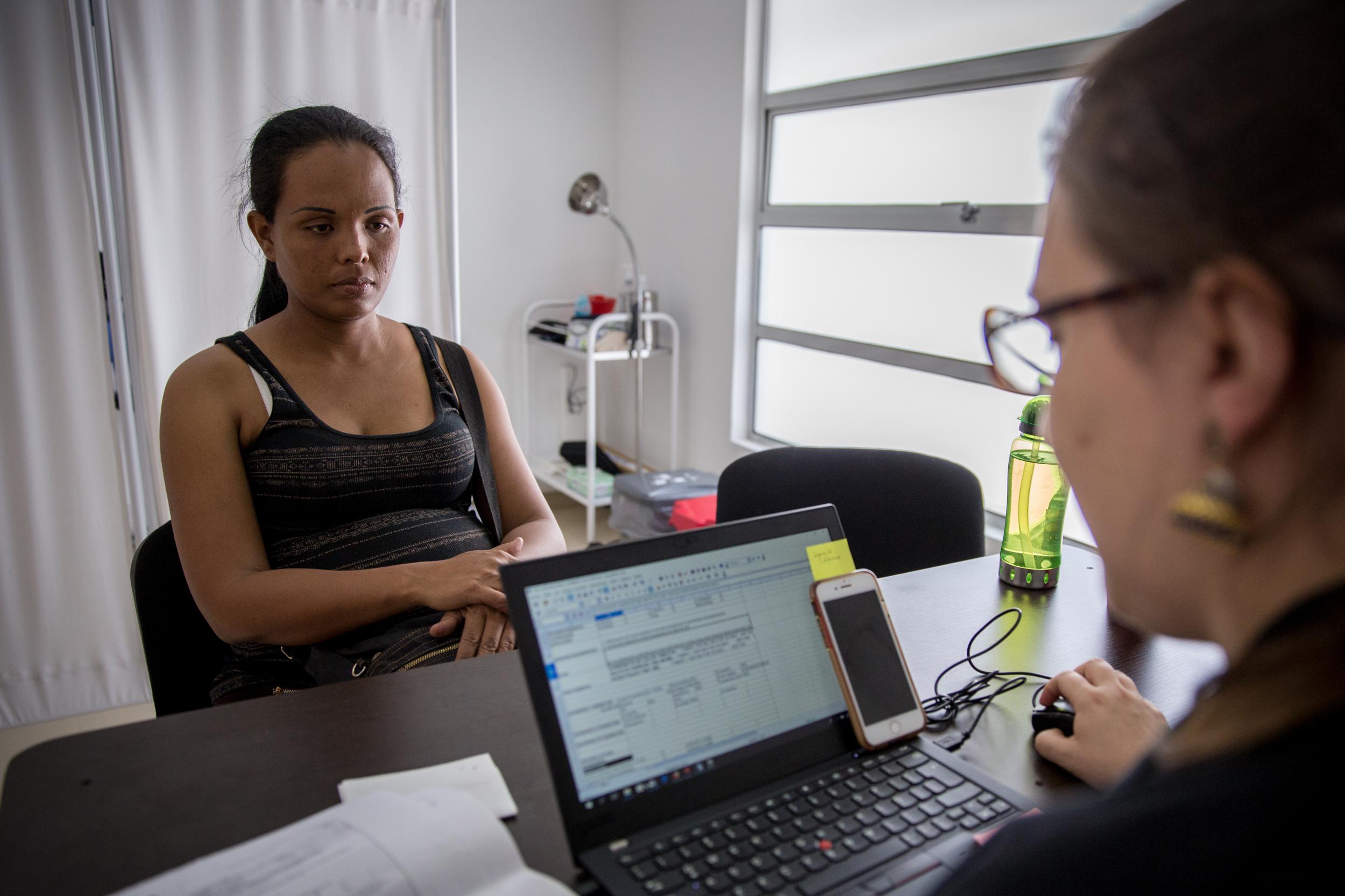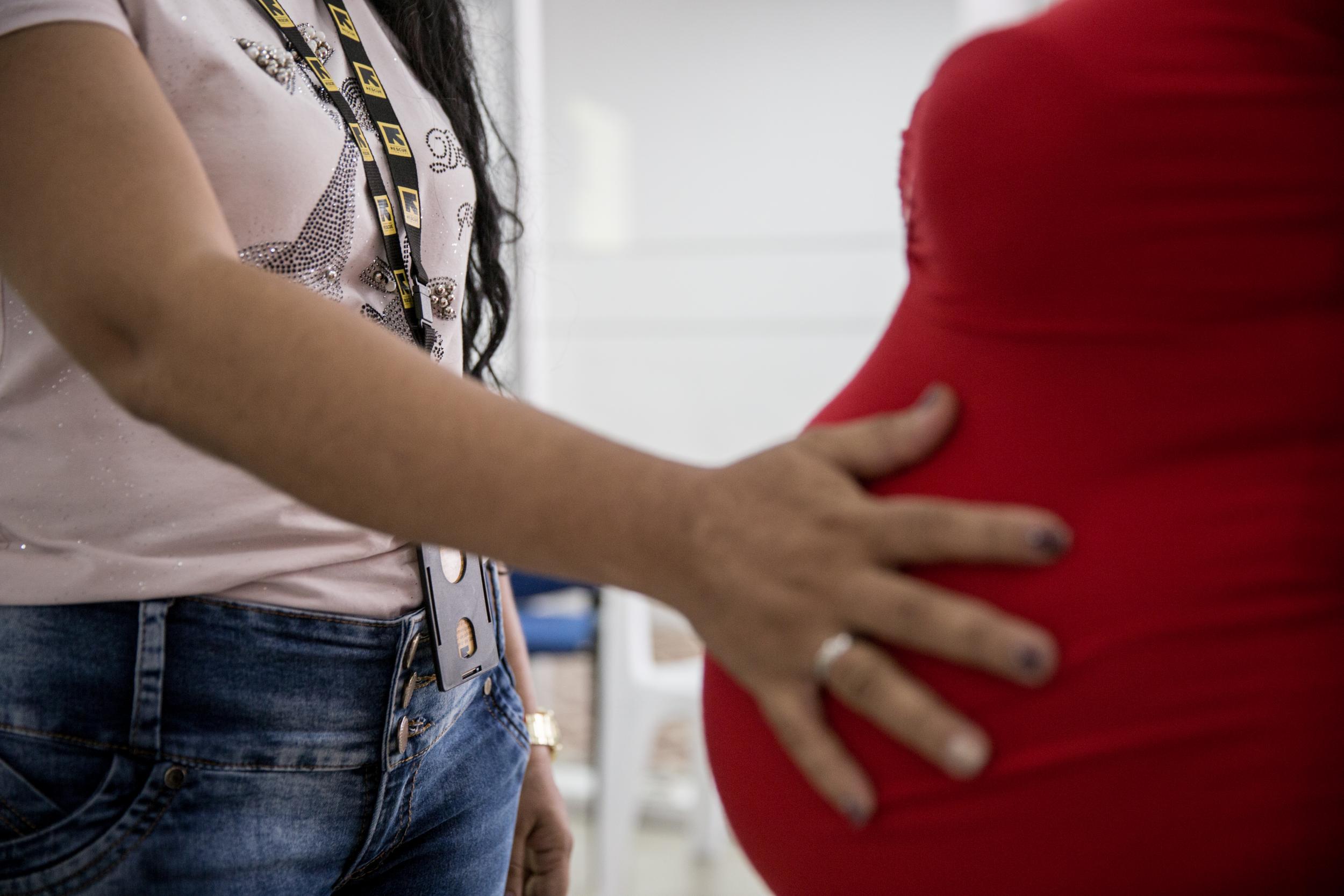Venezuelan women wade across rivers for medical care in Colombia: 'She was pregnant in need but could not cross and died'
Exclusive: 'There is nobody who can help the girls when they are sexually abused or raped'

The Simon Bolivar bridge, a major pedestrian crossing between Venezuela and Colombia, used to be a sea of people but has metamorphosed into little more than a trickle of incoming traffic since the border was shut by the Venezuelan government over a month ago.
The bridge, a concrete structure around 300m long and 7m wide, had been called the “bridge of desperation”. If you look down from it now you can see illegal crossings, locally referred to as “trochas”, teeming with people.
“The illegal crossings are busy – they even have plastic chairs and tables. It is like a shanty town. People are selling food. It is chaotic,” Marianne Menjivar, the International Rescue Committee’s (IRC) country director for Colombia and Venezuela, explains.
She says the crossings are operated by illegal armed groups who charge fees to let people pass – with Venezuelans fleeing their crisis-stricken land forced to navigate rocks and cross a fast-flowing river.
“There are more than 200 illegal crossing points,” she says. “It is almost impossible to keep count of them. Each crossing point is controlled by gangs. Robberies happen. You have to pay illegal criminal groups to cross. People get stuff stolen from them. They get sexually accosted. There is sexual harassment. There are rapes.”
The border from Venezuela to Colombia was closed on 23 February – thrusting more than 30,000 people who cross the border between the two countries every day to buy food, medicine and other basic supplies into the bleak dilemma of either going without those items or crossing the border illegally.
“Women who need medical services are in a vulnerable place, yet they have to trek to Colombia to access quality services. That in itself is a strain,” Ms Menjivar adds. “While the border has been closed, women have been trapped. Some started using illegal crossing points. This represents a danger and is especially so for pregnant women.”

She says she recently met a 23-year-old woman called Lorena, who was five months pregnant and visiting the IRC’s centre in Cucuta, a Colombian city close to the Venezuelan border. She was there to receive free antenatal care, which is not available in Venezuela because of the high costs and medicine shortages.
“She was forced to use an illegal crossing point, wading through a river, putting both herself and her baby in danger,” Ms Menjivar says. “She didn’t have the money to pay the gangs that control the crossing points so she crossed alone, out of sight, putting herself in greater danger.”
Some 200 women have missed appointments at the IRC’s clinics in recent weeks – with campaigners saying this is likely to be due to the border closure. This figure makes up 15 per cent of all appointments at the centre. While some do not want to make the risky journey to cross the border illegally, others are not able to afford the fees charged at the “trochas”.
Fortunately, a so-called humanitarian corridor was opened on 11 March – meaning pregnant women, the elderly and children in school uniforms were then able to cross into Colombia, the latter to attend school there.
But this was not officially communicated and some people – such as Lorena who crossed the river – were not immediately aware that the border had opened for them.
Rocio Ureina, a 28-year-old Venezuelan woman who is nine months pregnant, says her best friend died just over three weeks ago because she was not able to cross the border.
“She was pregnant and needed to have surgery but she could not cross and died,” she says. “She had been to the hospital [in Venezuela] but nobody did anything for her and she did not have any money to go to another hospital. The baby died inside of her and then she died.”
Ms Ureina, who is soon due to have her own baby, was born in Venezuela and all her family live there, but she was forced to go to Colombia to access medicine and receive antenatal care. She says if she did not have two children – who are aged 12 and nine – back in Venezuela, she would stay in Colombia rather than returning back there.
“In Venezuela, they have nothing,” she says. “Most of the time the doctors are not there because they are not paid. There is no medicine. They are always on strike. The only people who can get medical help in Venezuela are rich people. I have not had the need to cross illegally but recently I thought if they do not allow me to cross, I will go illegally because I do not want to miss my appointment. I was really scared of going illegally.
“If the guards on the border next to Venezuela see something they like of yours, they will just keep it. In Venezuela right now, people with arms rob people for their food, clothes, motorbikes, bikes.”

Ms Ureina, who crosses into Colombia via the Simon Bolivar bridge, which has long served as a concrete bottleneck for those fleeing Venezuela, says she did not know girls who had been sexually abused while crossing the border herself but she had heard about it happening. “You can go to the police and say what happens but they won’t do a thing,” she adds.
Kelly Cuellar, a 19-year-old Venezuelan woman who is seven months pregnant, says she has been forced to cross the border into Colombia because she can’t access antenatal care in Venezuela.
“I come and go from Venezuela to Colombia,” she says. “I am planning to come and live in Colombia but that can only happen once I have the baby. I am scared to have the baby in Venezuela because they do not have medicine.
“Crossing the border illegally is risky for men and women but more risky for women. It is dangerous crossing the river because the rocks are slippery and the river is really dirty. It is worse if you are with children and also more dangerous at night because they rob a lot and grab girls. If they see people with lots of suitcases they charge more. They change the amount – it’s between 5,000 and 10,000 Colombian pesos (£1.20 and £2.40) per person.
“There are people who are under the influence of drugs or men from guerillas who want to take the women and abuse them – that is very common at night. There is nobody who can help the girls when they are sexually abused or raped.”
Ms Cuellar says sexual abuse had been happening at the border for the last year and she would make sure she crossed the border in the daytime if she were ever forced to cross it illegally.
The Inter-American Commission on Human Rights has granted urgent protective measures for Maternidad Concepcion Palacios – one of the best known public hospitals in the country – which is in the Venezuelan capital of Caracas and primarily serves women living in poverty.
Some 15 women who went there to seek pregnancy-related care died in 2018 due to the inadequate conditions. Venezuelan women have been bearing the brunt of the country’s humanitarian crisis, according to activists – maternal deaths in the country have risen by 65 per cent between 2015 and 2016 and reports say violence and sexual assault against women is also rife.
Economic conditions in Venezuela have deteriorated since the country’s embattled president Nicolas Maduro took power in 2013. The oil-rich country is plagued with economic and political turmoil – with hyperinflation leaving the currency practically worthless and causing the cost of essentials to skyrocket, leaving many unable to afford basics such as food and medicine.
Crime is ubiquitous and the UN says about three million people have fled the country over the last few years in what is arguably the largest mass migration in Latin America’s history. The UNHCR has projected that two million more people could leave Venezuela this year.
Last month, the Venezuelan Guard killed four protesters and wounded hundreds of others who were attempting to bring humanitarian aid across the border. The Trump administration has been trying to get food, medicine and other supplies to desperate Venezuelans, but Mr Maduro has rebuffed these efforts and argued it is a bid to undermine his rule and the country’s sovereignty.
While Mr Maduro sits in the presidential palace, his leadership is no longer recognised by the US, Canada and a dozen Latin American countries. They support Juan Guaido – the young leader of the country’s opposition-dominated National Assembly who in January declared himself the country’s interim leader until free and fair elections are held.
Join our commenting forum
Join thought-provoking conversations, follow other Independent readers and see their replies
Comments
Bookmark popover
Removed from bookmarks